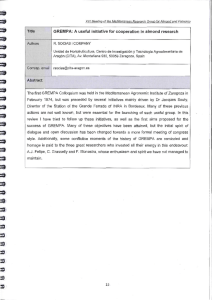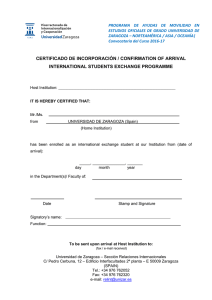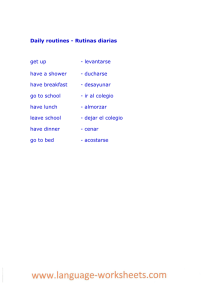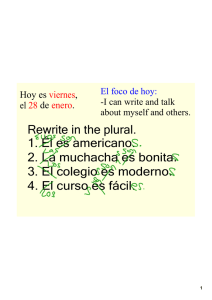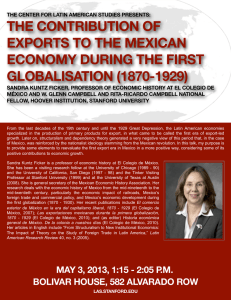1. I - Europa
Anuncio
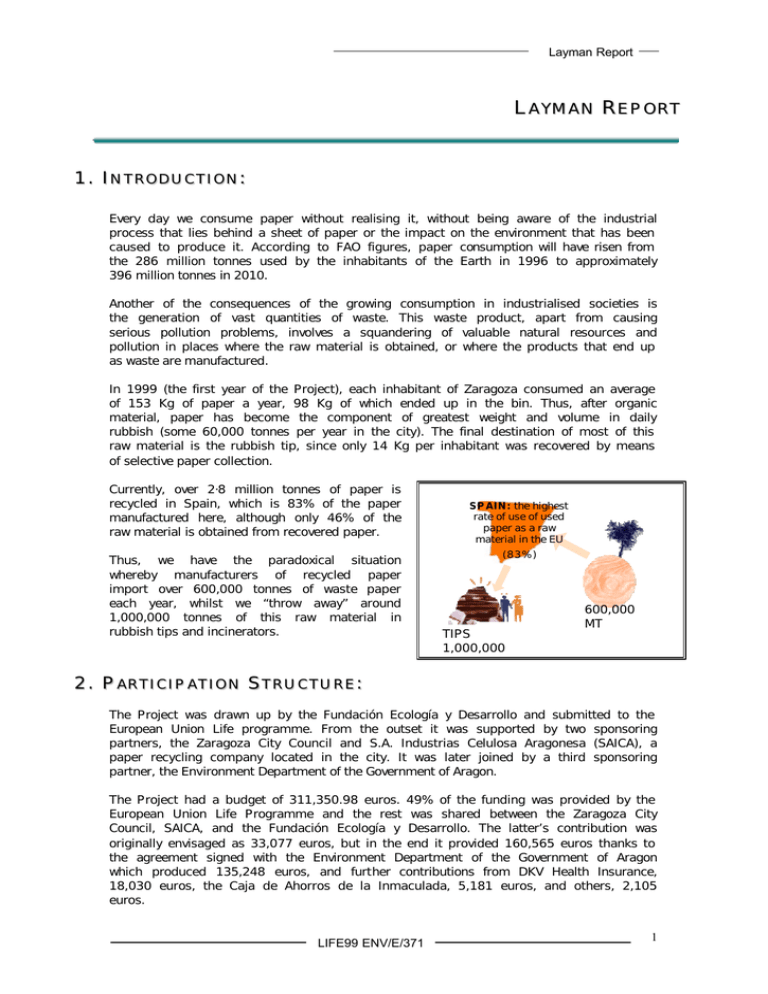
Layman Report L A YM A N R E P O R T 1. IN TRODU CTION : Every day we consume paper without realising it, without being aware of the industrial process that lies behind a sheet of paper or the impact on the environment that has been caused to produce it. According to FAO figures, paper consumption will have risen from the 286 million tonnes used by the inhabitants of the Earth in 1996 to approximately 396 million tonnes in 2010. Another of the consequences of the growing consumption in industrialised societies is the generation of vast quantities of waste. This waste product, apart from causing serious pollution problems, involves a squandering of valuable natural resources and pollution in places where the raw material is obtained, or where the products that end up as waste are manufactured. In 1999 (the first year of the Project), each inhabitant of Zaragoza consumed an average of 153 Kg of paper a year, 98 Kg of which ended up in the bin. Thus, after organic material, paper has become the component of greatest weight and volume in daily rubbish (some 60,000 tonnes per year in the city). The final destination of most of this raw material is the rubbish tip, since only 14 Kg per inhabitant was recovered by means of selective paper collection. Currently, over 2·8 million tonnes of paper is recycled in Spain, which is 83% of the paper manufactured here, although only 46% of the raw material is obtained from recovered paper. Thus, we have the paradoxical situation whereby manufacturers of recycled paper import over 600,000 tonnes of waste paper each year, whilst we “throw away” around 1,000,000 tonnes of this raw material in rubbish tips and incinerators. SP AIN: the highest rate of use of used paper as a raw material in the EU (83%) TIPS 1,000,000 MT 600,000 MT 2 . P ARTI CI P ATI O N STRU CTU RE : The Project was drawn up by the Fundación Ecología y Desarrollo and submitted to the European Union Life programme. From the outset it was supported by two sponsoring partners, the Zaragoza City Council and S.A. Industrias Celulosa Aragonesa (SAICA), a paper recycling company located in the city. It was later joined by a third sponsoring partner, the Environment Department of the Government of Aragon. The Project had a budget of 311,350.98 euros. 49% of the funding was provided by the European Union Life Programme and the rest was shared between the Zaragoza City Council, SAICA, and the Fundación Ecología y Desarrollo. The latter’s contribution was originally envisaged as 33,077 euros, but in the end it provided 160,565 euros thanks to the agreement signed with the Environment Department of the Government of Aragon which produced 135,248 euros, and further contributions from DKV Health Insurance, 18,030 euros, the Caja de Ahorros de la Inmaculada, 5,181 euros, and others, 2,105 euros. LIFE99 ENV/E/371 1 Layman Report 3 . O B J E CTI VE S OF TH E PROJ E CT: The aim of the Project is to promote a change in society’s concept of paper consumption by intervening in the factors that condition the use of this resource and the management of a large part of domestic rubbish (paper represents 20% of the content of rubbish bags). Therefore we should point out a series of objectives which, if they are met, will help to stimulate society and promote the following changes: 1. To emphasise the need to rationalise paper consumption, by persuading society to use paper with the utmost efficiency, thereby reducing consumption. 2. To increase and consolidate, by the end of the project, selective collection of waste paper in Zaragoza (34 kg per inhabitant of waste paper collected per year). 3. To promote the use of recycled paper. It is necessary to create a demand for recycled paper by stimulating the market for “green products” as against products with high levels of environmental impact, thereby giving an impulse to selective collection and the recycling of paper products in Spain. Not only is it important to recycle paper: we also need to consume products manufactured from this recycled paper. 22000 LIFE OF THE PROJECT 20500 19000 Figures for public paper and cardboard collection in Zaragoza (tonnes): Over the last three years there has been an increase of 15·57%. tonnes 17500 16000 14500 13000 11500 10000 8500 7000 1999 2000 2001 estimate 2002 estimate equipement committed In the city, a collection rate of 20 kg per inhabitant has been achieved. Moreover, Zaragoza is the Spanish city which collects the highest amount of waste paper per container, at 15 tonnes per container a year (compared with other Spanish cities with a similar amount of inhabitants for each container). The figure of 34 kg of waste paper collected per year has not yet been achieved, but the agreements reached with the City Council on infrastructure for selective collection, and the tendencies created throughout the project, ensure that this objective will be achieved in the near future. 4. CRITE RIA ON WH ICH TH E PROJ E CT I S B AS E D : In order to promote rational use of paper, reducing the use of natural resources and to promote selective collection of waste paper, bearing in mind that our rubbish contains raw materials for certain industrial processes, we have established a series of criteria that form the basis of the Project: - Tackling paper saving using a systemic approach, by intervening in all factors that condition today’s squandering of paper, based on consumer habits, waste disposal rates, the technology available, institutional policy, information, etc. LIFE99 ENV/E/371 2 Layman Report - Fostering shared responsibility, bearing in mind that all players making up the problem should take part in the solution. For the success of this initiative, we have needed to count on the contribution of the citizens, public bodies, institutions and collectives that condition the current trend in paper usage and waste management in Zaragoza, and they have become the leading players in the Project. - Simultaneous and coordinated articulation of awareness-raising measures with investments in equipment and logistic actions required for ensuring a suitable institutional response to public participation in selective paper and cardboard collection. - The use of a series of educational establishments and major buildings in the city as innovative locations, “friends of the trees”, which will become social models with regard t o paper use and management, and spreaders of new practices in the city. - Feedback on the achievements made, as a form of motivation for meeting the proposed objectives. - Raising society’s awareness to use paper with the utmost efficiency, reducing consumption of this natural resource and fostering prevention in generating waste materials. - Supporting individuals and collectives who have shown willingness to develop good practices in the use of paper by carrying out audits on paper use and consumption and providing selective collection systems. 5. ME TH ODOL OGY: The work carried out in the Project has been divided up according to the different types of target public for whom the objectives are designed. Thus we have drawn up activities directed at all the social agents that count when introducing the proposed changes. In addition, we have worked hard to provide the necessary equipment for consolidating selective collection, and for creating public support strategies and policies and fostering the prevention and recycling of urban waste paper. There follows a brief summary of the most relevant strategies: Large-scale paper and cardboard consumers: In this category we have included activities directed at public authorities, social organisations, companies and industry – the main consumers of paper in the city. In addition, it should be borne in mind that paper accounts for 90% of waste product in offices. Actions carried out have consisted of: - - Eco-audits for efficient paper usage in 31 major buildings in the city (originally, 20 buildings were envisaged), which have become “friends of the trees”, introducing practices to reduce consumption: they now use recycled paper and have installed a selective collection system. The drawing up and publication of the “Paper Saving and Recycling Guide for Offices”, which enables a self-assessment of paper consumption and management. Internal selective collection system in Lackey S.A., a “friends of the trees” company. LIFE99 ENV/E/371 3 Layman Report - - Distribution of 2,500 containers for internal selective paper collection to “friends of the trees” buildings and over 100 collaborating organisations. The holding of two technical seminars on paper management in offices and the use of recycled paper by large-scale consumers. Attending to requests for information from large-scale paper consumers concerning waste recycling plants, recycled paper distributors, certification and types of paper, and the introduction of best practices. Educational establishments: Raising the awareness children with regard to the reduction, recycling and re-use of paper is an investment for the future. Educational establishments are essential for the teaching and learning of new habits that are more environmentally-friendly. For this reason we have implemented measures to increase recycling in educational establishments, to stimulate the use of recycled paper and foster lower paper consumption: - The drawing up and publication of graded educational material – “Paper Eco-Audits in the School” (2 teacher’s manuals and two student books). - 51 educational establishments in the city have become “friends of the trees”. The pupils have carried out eco-audits on the use, consumption and management of paper, introduced best practices with regard to consumption, using recycled paper, and have implemented a selective collection Presentation of educational activities by the pupils of C. Sta. Magdalena Sofía, closing system. ceremony. - Distribution of 2,500 containers for internal selective paper collection to “friends of the trees” educational establishments. Setting up a Collaborating Teachers Network, and the holding of 8 meetings of the Network. A competition with a prize being awarded for the best awareness-raising campaign conducted by schoolchildren. Attending to requests for information from schools concerning waste recycling plants, recycled paper distributors, certification and types of paper, and the introduction of best practices. Commercial establishments: Commercial establishments are large-scale generators of waste paper and cardboard. It is estimated that in Zaragoza alone they produce 24,000 tonnes of waste, but only a small fraction is recovered through selective collection systems. The collaboration of retailers in the Project is essential in order to change this situation, and for this reason we have drawn up various training and awareness-raising activities: - Logo of the awareness-raising campaign directed at retail establishments. An awareness-raising campaign directed at the city’s retail establishments with the distribution of a letter from the Mayor of Zaragoza, a letter from the LIFE99 ENV/E/371 4 Layman Report - - Chairman of the Zaragoza Retail Employers’ Federation, and a leaflet showing practices for reducing consumption and increasing paper recycling. Distribution by volunteers of a free Stanley knife to stimulate collaboration in selective collection and to provide information on the importance of separating at source paper and cardboard waste products in the 1,500 retail establishments located in the “door to door” collection area in the city. Attending to requests for information from retail establishments concerning waste recycling plants, recycled paper distributors, certification and types of paper, and the introduction of best practices. LIFE99 ENV/E/371 5 Layman Report Citizens: Reducing consumption and recycling is everybody’s responsibility. The public is one of the key factors for consolidating selective collection. Separating waste matter at source and subsequently leaving it the blue containers calls for public participation. For this reason we have concentrated on informing and raising the awareness of the entire local community: Waste paper container distribution in an educational establishment. - - - A publicity campaign consisting of four TV ads (broadcast over 50 times), 4 radio ads (broadcast over 190 times), 8 press ads (28 times) and street furniture (85 items of furniture). The distribution of 100,000 receptacles for at-source separation of waste paper in Zaragoza households. Promotion of selective collection of paper and cardboard, through the improvement of city collection systems. The creation of a website to spread information on the Project through the Internet. The Paper Newspaper: publication of two issues including the details of the Project. These were distributed without charge among the city’s various target publics and have been sent to various organisations and individuals in Spain and the rest of Europe. Attending to requests for information from the public concerning selective collection systems, recycled paper distributors, and ways to reduce paper consumption. Back-up policies: In addition, we have made a number of proposals for modifying urban waste management regulations with the aim of creating back-up strategies and measures for prevention and recycling urban waste, as we feel we are in a position to propose and stimulate changes which need to be approved by the appropriate public authorities: - - - - Organising the conference “Economic Measures for the Prevention and Recycling of Urban Waste”, with the participation of national experts and representatives from the public authorities involved in the subject. Organising a seminar on waste management costs, with representatives from the Zaragoza City Council and other cities in Spain. The production and publication of “Economic Measures for the Prevention and Recycling of Urban Presentation of the experts taking part in the “Economic Measures for the Prevention and Waste”, a book that includes the foremost talks Recycling of Urban Waste” conference, November given in the conference of the same name, as well 2000. as Declaration drafted by the Fundación Ecología y Desarrollo. The drafting of two proposals to modify Municipal Regulations regarding tipping fees, and direct mail-shots introducing criteria for promoting waste prevention and recycling, especially paper and cardboard waste. LIFE99 ENV/E/371 6 Layman Report 6 . RE S U L T S : Zaragoza, an example to follow in paper usage: Over a period of two years, we have succeeded in stimulating and galvanising Zaragoza society and in providing some key changes in consumption and paper and cardboard waste management trends. Some of the results obtained through measures implemented among the various target publics have shown this to be so: - - - - - - The city of Zaragoza has reached the figure of 15·01 tonnes of recovered paper per container, a figure that places it as a national benchmark for selective collection when the current level of equipment and population is taken into account. The number of selective collection containers has gone up from 500 to 721. The use of recycled paper has risen by 128% in 1999-2000 alone. 51 educational establishments have become “friends of the trees”; in other words, they have implemented measures to reduce consumption and improve waste paper management. 25,000 Zaragoza schoolchildren have taken part in the various activities of the campaign. 31 major buildings (public administrations, social organisations and companies) have become Awareness-raising campaign on street “friends of the trees”; in other words, they have furniture. implemented measures to reduce consumption and improve waste paper management. Over 100 social organisations in the city have collaborated by publicising the project and participating in selective paper collection. 5,000 cardboard containers have been installed for the consolidation of internal selective paper and cardboard collection in public administrations, social organisations, companies and educational establishments. 80 organisations have distributed 100,000 paper bins for at-source separation of waste paper in Zaragoza households (nearly half the homes in the city). www.ecodes.org/lifepapel receives some 1,000 visits per week. Over 10,000 people have received at least one item of the material published during the life of the Project. Over 500 people have taken part in the various seminars held during the life of the Project. 140 volunteers have distributed information on selective collection and Stanley knives to help with the folding up of cardboard boxes in the more than 1,500 retail outlets located in the door to door collection area. 8,000 retail outlets (practically 100% of all retail outlets) have received information on paper saving and paper selective collection systems. Transfer of results: The lessons learnt and the activities carried out can be transferred to any city or region that may wish to consolidate selective paper or cardboard collection, or work on reducing paper consumption. Thus, in 2001, the Burgos City Council adopted the Project’s educational material and this has been used in the city’s educational establishments. We have also run an awareness-raising project for the consolidation of selective paper and cardboard collection in the District of Sobrarbe (Huesca), which to a large extent has LIFE99 ENV/E/371 7 Layman Report involved transferring the lessons learnt from the Project carried out in Zaragoza to the rural environment. It should be pointed out that the Project’s website receives an average of 1,000 visits a week, some 50% of which are from Latin America. Experience gained: An analysis of our experience concerning reduction in paper consumption and the consolidation of selective collection of waste products has provided us with several lessons: - - Institutional policies that act as an incentive for reduction and recycling of waste are an essential complement for the consolidation of selective collection.; Fluctuations in the recovered paper market mean that there are problems in maintaining a reference price that will help to consolidate a recovered paper market that is independent of the large commercial groups; Press conference held in the C.P. Eliseo Godoy Beltrán to present the household waste-paper basket, 4th June 2001. R= E + P + N + S + C Where: - - - - - R= Selective collection E= Equipment P= Price of recovered paper and cardboard N= Regulations S= Awareness-raising C= Coordination The existence of adequate equipment is essential for ensuring the proper running of the management system, taking into account a ration of at least one container for every 500 inhabitants, as shown in the National Waste Management Plan (the greater the number of containers, the less distance a person has to go to leave his waste paper, and therefore the effort is less); Training and providing the public with information is essential for increasing the volume of waste paper collected in containers and for avoiding the leaving of any inappropriate material in the container; There is a problem, in some cases almost insurmountable, when collecting waste products from small-scale producers. Established paper recovering companies only bother collecting from large-scale waste paper producers, and this helps to make their business profitable bearing in mind the price of recovered paper. Thus, there is no willingness to recover waste paper from small-scale sources (professionals, offices, SMEs, the premises of social organisations) because of the lack of paper recovery firms to meet these needs. Eco-audits are a key element when introducing changes in social organisations, public institutions, companies and offices. However, it is important to underline the need to have constant feedback so that those in charge of carrying out the audit have the proper information at their disposal to enable them to bring about the necessary changes in paper consumption habits. Working with schoolchildren is necessary, fundamental and rewarding as far as the results obtained and participation are concerned. However, great thought must be given when offering ideas and proposing new or different activities to make them an attractive part of the crowded programme on offer in educational establishments. LIFE99 ENV/E/371 8 Layman Report - - Without doubt, retail outlets are one of the largest sources of waste paper in the city. For this reason, most of the problems associated with overloaded containers springs from the depositing of shop waste paper, especially cardboard packing material. Specific action aimed at training and informing retailers is essential in order to avoid these problems. Similarly, door-to-door collection is an effective system for recovering this waste, and it therefore needs to be given a boost. Seminar on paper management in offices held in the premises of the Confederación de Empresarios de Aragón, November 2001. In the modification of consumer habits and the use of recycled paper instead of paper produced from virgin fibre, we find ourselves up against old ideas and attitudes that need to be broken. It is common to meet reluctance towards recycled paper because of its quality, price and potential problems with regard to office equipment. This is a problem caused by lack of information and reluctance to confront changes in habit. Future actions: On completion of the “Zaragoza Saves Paper.... and Trees” Project, and as a result of the work carried out, the Fundación Ecología y Desarrollo proposes to continue working on responsible consumption and the consolidation of selective waste paper and cardboard collection. We are currently running various initiatives to continue working with these objectives in the city of Zaragoza. In addition, various cities in Spain, such as Burgos or Jaca, have shown interest in the subject, and we are working with them with the aim of running various activities. Furthermore, we are continually working to reach various agreements to consolidate the maintenance of the Project’s website. Finally, we are in contact with various national organisations, ASPAPEL and AFCO among others, to promote specific activities to stimulate the use of paper and cardboard as against other nonbiodegradable products. LIFE99 ENV/E/371 9 Layman Report L I S T OF F RI E N D S OF T H E T RE E S : Public Organisations and Administrations Centro de At. Primaria Actur Sur Centro de At. Primaria San José Centro Centro de At. Primaria San José Norte Centro de At. Primaria San Pablo Diputación Provincial de Zaragoza Dirección At. Primaria Áreas 2 y 5 (Insalud) Dir. Territorial, Zona 4ª Correos y Telégrafos El Justicia de Aragón Facultad de Derecho, Universidad de Zaragoza Hospital Miguel Servet Hospital Royo Villanova Juez Decano de los Juzgados de Zaragoza Juzgado de Instrucción nº 3 Registros de la Propiedad de Zaragoza Social Organisations Fundación Ramón Rey Ardid Educational Establishment (cont’d) Colegio Condes de Aragón Colegio Cristo Rey Escolapios Colegio Escuelas Pías Colegio Jesús María El Salvador Colegio Juan de Lanuza Colegio La Purísima y San Antonio Colegio La Salle Montemolín Colegio Laviaga Castillo Colegio Lestonnac Colegio Liceo Europa Colegio María Rosa Molas Colegio Moliere Colegio Moncayo San Valero Colegio Público Basilio Paraíso Colegio Público Cesáreo Alierta Colegio P de Educ. de Adultos Juan José Lorente Scout de Aragón Colegio Público Eliseo Godoy Beltrán Business Colegio Público Eugenio López y López Cámara de Comercio de Zaragoza Colegio Público Hilarión Gimeno Confed. Regional de Empresarios de Aragón Colegio Público Basilio Paraíso CEPYME Aragón Colegio Público Cesáreo Alierta DKV-Seguro Colegio Pº Educación Adultos Juan José Lorente Fersa Rodamientos Europeos S.A.L. Colegio Público Eliseo Godoy Beltrán Grupo La Veloz Sociedad Cooperativa Colegio Público Eugenio López y López Hispano Carrocera, S.A Colegio Público Hilarión Gimeno Iberlingva Colegio Público Zalfonada Industrias SERVA, S.A Colegio Romareda Kaeser Compresores, S.L. Colegio Sagrado Corazón (Corazonistas) Kalibo, Correduría de Seguros, S.A. Colegio Salesianos Nuestra Señora del Pilar Lackey S.A. Colegio San Alberto Magno Radio Zaragoza Cadena SER Colegio Santa Magdalena Sofía Serunión Colegio Santa María del Pilar Marianistas Sindicato UGT- Aragón Fundación San Valero Supermercados SABECO SA IES Andalán Tailor Metal, S.A. IES Corona de Aragón Valeo Térmico Motor S.A. IES El Portillo Vitrogar S.A. IES Félix de Azara Educational Establishments IES Grande Covián Asociación Juvenil Almozandía IES Ítaca Centro de Tiempo Libre Cadeneta IES Joaquín Costa, Cariñena Centro Ocupacional Vértice IES Los Enlaces Centro Ocupacional Romareda IES Luis Buñuel C.O.D. Santo Domingo de Silos (primaria) IES Pablo Gargallo Colegio Calasancio IES Pilar Lorengar LIFE99 ENV/E/371 10 Layman Report Colegio Cándido Domingo IES Ramón y Cajal LIFE99 ENV/E/371 11 Layman Report P ROJ E CT COL L ABORAT ORS : Public Organisations and Administrations Public Organisations and Administrations Alcaldía de Barrio Rural de Casablanca Sociedad Municipal de Rehabilitación Alcaldía Barrio Rural de San Juan de Torreón Fortea, Ayuntamiento de Zaragoza Mozarrifar Apoyo a la Escuela Ayuntamiento de Leganes Unidad de Atención Domiciliaria 061 (INSALUD) Area Servicios Públicos, Ayunt. de Zaragoza. Univ. de Zaragoza, Centro Politécnico Superior Bibliotecas Públicas Municipales (22 Universidad Pública de Navarra centros) Centro de Atención Primaria Picarral Social Organisations Centro Nacional de Educación Ambiental Centro de convivencia 3ª edad de Torrero Consejo Protección de la Naturaleza de Centro Cultural la Almozara Aragón Comisión Medio Ambiente, Cortes de Aragón Centro del Producto Reciclado Gobierno de Aragón. Dep. de Educación CEPA Gobierno de Aragón. Dep. de Medio Colegio Oficial Adm. de Fincas Urbanas Ambiente Aragón Instituto Aragonés de Fomento (IAF) Federación de Asoc. de Barrios de Zaragoza Instituto Aragonés de la Mujer (IAM) Fundación Dexailles Grupo Municipal CHA, Ayt. de Zaragoza GEA 21 Grupo Municipal PP, Ayt. de Zaragoza Gedesma Grupo Municipal PSOE, Ayt. de Zaragoza Greenpeace Hospital Provincial. Servicio de Psiquiatría Grupo Ornitológico Balear (GOB) Junta Municipal de Distrito La Almozara IFET Junta Municipal de Distrito Margen Organización Juvenil Española (OJE) Izquierda Junta Municipal de Distrito San José Parroquia Corazón de María Junta Municipal de Distrito Universidad Parroquia San Gregorio Junta Vecinal Barrio San Gregorio Partido Comunista de Aragón Patronato Municipal de Turismo Sindicato de trabajadores CC.OO. Aragón Plan Integral del Casco Histórico Sociedad Española de Ornitología (SEO) S.A. Zaragoza Deporte Municipal Traperos de Emaús Pamplona Saneamientos de Córdoba S.A (SADECO) Unión de Asociaciones de Vecinos Cesaraugusta Servicios Sociales, Ayuntamiento de WWF Adena Zaragoza (sigue) LIFE99 ENV/E/371 12 Design of household wastepaper bins and other awareness-raising elements by Isidro Ferrer, National Design Prize, 2002. Layman Report PROJECT COLLABORATORS Business Business Agroseguros S.A. ADIDAS Zaragoza, Departamento de RR.HH. AENA Aeropuerto de Zaragoza Arrondo, S.L Artec S.L. Asoc. Detallistas Mercado Central de Zaragoza Asociación Española de Recuperadores de Economía Social y Solidaria (AERESS) Asociación Nacional de fabricantes de Pasta, Papel y Cartón (ASPAPEL) BSH Balay S.A. BSH Electrodomésticos España S.A. BSH Interservice S.A. Caja de Ahorros de la Inmaculada CODEF Colectivo de Educación Ambiental SL (CEAM) DAPSA Echezarreta, S.A. Envega. S.Cop. Euroresiduos, S.L FCC, S.A. delegación de Aragón Fremap Galvasa Garcés Recuperaciones S.L. Geplass Metal Hotel Boston IBM Zaragoza IDOM Ingeniería Inversiones Rentaragón S.A. Isolux War, S.A. Izquierdo Informática Jhonsons Control Ligallo de Fablans de L'Aragonés Limasa López y Torres, S.L MAGISTER Menaje y Confort Ortofoto S.A Pariber, S.A. Punto de Comunicación Recae Reciclajes Aragoneses S.A. (REASA) Recicleta Repacar (Asociación Española de recuperadores de papel y cartón) Federación de Empresarios de Comercio y Servicios de Zaragoza y Provincia (ECOS) Sansueña, Industrias Gráficas S.A. Taller Fogaral Torras Papel S.A. Transportes Vía Augusta S.A. TYPSA Educational Establishments Centro de Educación de Adultos Gómez Lafuente Centro Educ. Infantil y Primaria A. Martínez Caroy Centro de Profesores y Recursos Juan de Lanuza Centro de Reforma San Jorge Colegio Andrés Olivan Colegio Británico de Aragón Colegio Hermanos Argensola Colegio La Portalada Colegio Las Anas Colegio Madres Escolapias Colegio Mayor La Anunciata Colegio Público Andrés Manjón Colegio Público Buen Pastor Colegio Público César Augusto Colegio Público Doctor Azúa Colegio Público San José de Calasanz CRA las Viñas Colegio San Vicente de Paúl Escuela de Tiempo Libre Oliver Max-Planck Gym Gelsenkirchen, Deutschland Northgate High School Dereham, England LIFE99 ENV/E/371 13
